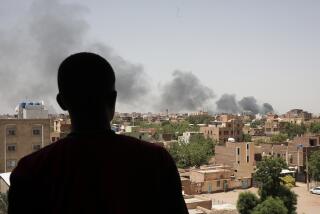Powell Arrives to Bolster Sudan Talks
- Share via
NAIROBI, Kenya — Secretary of State Colin L. Powell arrived here Tuesday to encourage Sudanese rebels and government officials holding peace talks in the resort town of Naivasha to bring their 20-year war to a speedy resolution.
Powell’s two-day visit, coming after the Asia-Pacific Economic Cooperation summit in Thailand, is largely a symbol of U.S. support, as negotiators say that a peace deal is unlikely before December.
The current round of Kenyan-brokered talks have been hailed as the most promising in the long conflict between the Muslim-dominated north and rebels in the south, where Christianity and traditional African religions dominate. The war has left more than 2 million dead, mostly from starvation and disease.
Last month the Khartoum-based government and the Sudanese People’s Liberation Army agreed on troop placements for an interim period. More recently, the two sides began discussing wealth- and power-sharing proposals that would determine the structure of a six-year transitional government and the control of Sudan’s oil resources.
At the end of the interim administration, southern Sudan would hold a referendum to decide whether it would seek independence.
An armistice in Sudan would help stabilize the East African region, analysts say.
Powell’s 747 arrived at Kenyatta International Airport on Tuesday afternoon with a delegation of 40 officials. Powell met U.S. Ambassador William Bellamy there and was whisked away in a convoy of sport utility vehicles and Mercedes-Benzes.
Later, Powell met privately with embassy staffers, Assistant Secretary of State for African Affairs Walter Kansteiner, Kenyan Cabinet officials and President Mwai Kibaki, back from a state visit to Washington last week. Powell and Kenyan officials discussed efforts to stem the tide of AIDS-related deaths, as well as further steps in the U.S.-declared war on terrorism.
In recent months, Kenya has taken the lead among African nations in apprehending suspected terrorists. The government made security issues a priority after successive terrorism alerts led to the diversion of airline flights from Europe and the United States and the decline of Kenya’s large tourist industry.
It was unclear Tuesday whether Powell would bring up the subject of Kenya’s endemic corruption. Kibaki came to power last year with a mandate to tackle the government abuses that were a central feature of President Daniel Arap Moi’s 24-year rule.
Last week, Kibaki suspended half the nation’s top judges and set up tribunals to try them. Although the move has been hailed as a strong step against corruption in the judiciary, government critics say that many of the worst judges have been left out and that the proceedings are biased. Nearly all the members of the panel investigating the judiciary are part of Kibaki’s powerful Kikuyu tribe, while virtually none of the suspended judges are.
Last month, Kenya’s constitutional reform conference was disrupted when gunmen killed a leading member, Odhiambo Mbai, a University of Nairobi political science professor. Government critics said the killing was a political assassination meant to silence Mbai and to intimidate other delegates pushing for more decentralized power. A series of media reports revealed possible government involvement.
Three local reporters were jailed after they published transcripts of interrogations of suspects in the slaying. The journalists were freed after international human rights groups and press associations accused the government of using scare tactics to squelch news reports.
Powell will travel to Naivasha today to hold a news conference and to meet with rebel leader John Garang and Sudanese Vice President Ali Osman Mohammed Taha before leaving for Madrid for a conference on Iraq.
More to Read
Sign up for Essential California
The most important California stories and recommendations in your inbox every morning.
You may occasionally receive promotional content from the Los Angeles Times.












